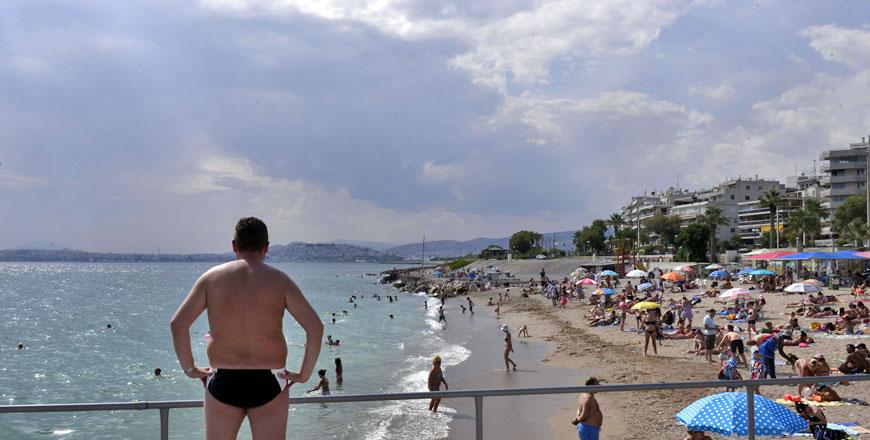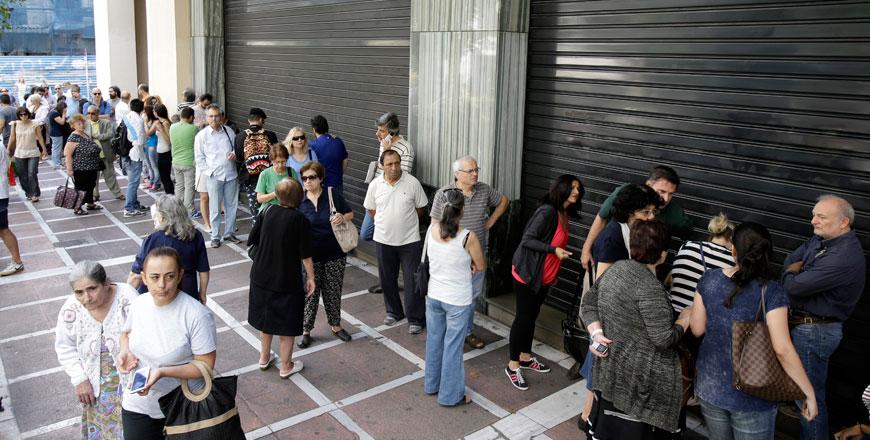You are here
On beaches and in cafes, gloomy Greeks watch country teetering on brink of default
By Agencies - Jun 28,2015 - Last updated at Jun 28,2015

Greeks enjoy a day out on the beach in Athens on Sunday (AFP photo)
ATHENS — Greeks took to beaches, cafes and churches on Sunday, just like they do every week, but the mood was downbeat as the country teetered on the brink of a default that could see it crash out of the euro.
“Everyone is very sad, very upset and depressed,” said 42-year-old Anna Apostolopoulos as she sipped a coffee on the terrace outside the trendy Balux cafe in Glyfada, a well-heeled resort half an hour from Athens.
It will be a “miracle”, she added, if Greeks vote in favour of the creditors’ bailout proposal when it goes to a referendum next Sunday, and she blasted her government as “immature children” for putting it to a public vote in the first place.
“They are terrible negotiators,” she indicated. “The prime minister is very, very irresponsible. He was elected to make decisions.”
Greeks were nevertheless refusing to let the crisis ruin their weekend entirely, and all the deckchairs on the beach were occupied.
“Yesterday I didn’t want to go to the beach,” Apostolopoulos said. “I watched TV all day and I felt down. But I promised my son we would go, so we went.”
A short stroll away, laboratory chemist Joanna Avayanos said she was worried by talk of a return to Greece’s former currency, the drachma.
There have been queues at some ATMs amid growing signs of a bank run, and like other jittery compatriots worried that the government may introduce capital controls, Avayanos has been trying to withdraw cash.
“Yesterday with my mother we went to two cash machines and it said there was a problem,” added Avayanos as she walked her daughter along the beach in a stroller. “In the supermarket, we could not use our card. That made me suspicious. I don’t know what is going on.”
‘Cash running out at ATMs’
Since Prime Minister Alexis Tsipras announced the referendum early Saturday, about 1.3 billion euros ($1.45 billion) have been withdrawn from Greek banks, according to the head of the bank workers’ union Stavros Koukos.
According to an anonymous banking source in Greece, only 40 per cent of the nation’s cash machines currently have money in them, purely because they cannot be restocked with banknotes quickly enough.
Tsipras’ governing radical left party Syriza, which rose to power in January on an anti-austerity ticket, slammed the creditors’ latest offer, arguing it would hurt workers, pensioners, young people and farmers, and has urged Greeks to vote against it in the referendum on July 5.
But Andreas Nikolopoulos, waiting outside a church in Athens with her young daughter, described the referendum issue as “tricky”.
“It [would be] a yes to Europe, not a yes to austerity measures,” she indicated.
She said that a Greek exit from the eurozone would be “painful, very painful. I have family in Australia, Canada... I have a job opportunity in Munich. But the neighbours, my friends, my family, are trapped.”
Among other demands, Greece’s creditors want public sector wage cuts and higher taxes on food and restaurant meals, in return for five-month, 12-billion-euro ($13.4-billion) extension of the bailout programme.
Retired nurse Fotini expressed anger at six years of economic downturn and painful austerity measures demanded by previous European Union (EU)-International monetary Fund (IMF) bailouts, including cuts to her pension.
“We have had too much [of the] bad times,” the 76-year-old told AFP as she sat on a bench in Syntagma Square in central Athens, waiting for a friend.
“The money the government gives me is down every month,” she said in reference to her pension, a key area which creditors had targeted for state cutbacks. “Greek people want good lives, work... We have too many men and women without jobs. It is not right.”
By the time Greeks vote next Sunday on whether to back the proposed bailout package, Greece may have already defaulted on the IMF payment that is due Tuesday.
Marina Stoianovitch, 17, said people would simply have to put on a brave face.
“We are going to be a different country. We are going to control our economy,” she said as she stood outside a church in Athens. “This is not good, but I don’t see another way. We will find a way.”
Separately, Alexis Kalaitzoglou makes a swift gesture to describe what he thinks about Tsipras: the shopkeeper in Paros, a busy tourist island, pulls his leg back and swings it forward as if to give Greece’s leader a good kicking.
Kalaitzoglou is angry because his family’s shop of jams, honeys and wooden handicrafts, part of a wider tourism industry that is the only bright spot of Greece’s struggling economy, may be in for a rough ride.
A rise in consumer taxes on Greek islands’ goods and services such as the ones Kalaitzoglou sells is one of the sacrifices creditors are seeking from Athens to unlock bailout funds that will allow Greece to remain in the euro.
The tax hike is one of the sticking points thwarting a deal and prompting Tsipras to call a July 5 referendum on the bailout terms.
Yet even before the vote, Greece is likely to default on a debt payment, setting off a financial crisis that could damage an upcoming tourist season expected to be one of the most vibrant in years.
The creditors want to raise VAT rates for services such as restaurants and hotels as well as ending the tax breaks for islands like Paros in the Cyclades.
The tax breaks are intended to make resorts more attractive and also shield poorer, more remote communities from the higher costs of transporting goods. Raising them would force businesses to jack up their prices at the risk of driving customers away, or face a sharp drop in revenues.
“If the VAT rises to 23 per cent in all goods, we better jump in the sea and be done with it,” said the 62-year-old Kalaitzoglou.
On Paros and other islands, VAT rates are 30 per cent lower than on the mainland. For example, they pay a VAT rate of 9 per cent on food that could be raised to 23 per cent.
“The sea and the tourism are the backbone of our economy, if we touch that too, there is no future anymore,” he indicated.
The anger of Kalaitzoglou and others underscores Greece’s dilemma as it flirts with an exit from the euro single currency.
“We all know, the biggest importer of currency is tourism. If tourism is hurt, it will have a knock-on effect on the economy, a recessionary spiral, and then how will lenders be repaid?” said Paros hotel owner George Mbafitis.
One bright spot
One in four Greeks is out of work and an average of 59 businesses are closing daily, according to the National Confederation of Hellenic Commerce.
But tourism, which accounts for nearly a fifth of Greek’s yearly output, has shrugged off the gloom. The Association of Greek Tourism Enterprises reported a provisional 15.4 per cent increase in tourism arrivals through international airports in the country in 2014.
Year to date data by the association put arrivals up by 17.5 per cent in the first quarter of 2015.
Proposals for tax hikes have emerged after a months-long tug of war with the Greek government over where to find cost cuts.
Tsipras’s junior coalition ally has threatened to pull the plug on the government if any tax hikes on islands materialise.
Critics argue the tax rises are a lazy way to raise revenue at the expense of real reforms to the Greek economy, such as tackling corruption and tax evasion, overhauling labour regulations and cutting down a bloated pension system.
“They don’t want to touch the privileged, which are mostly public workers, who are the customers of the political parties,” said Nicolas Stephanou, who runs a tourism web portal in Paros.
Beyond the tax hikes, heightened uncertainty over whether Greece will stay in the eurozone is also beginning to hurt tourism business. Some companies have reported a drop in bookings from such travellers, partly perhaps because of scare stories of possible bank runs and street protests.
On Sunday, Germany’s foreign ministry advised tourists travelling to Greece to take plenty of cash with them in case of problems with local banks.
“I had customers this morning asking me what was happening, what they should do,” said Dimitris Stavrakis, a hotelier from Paros. “This thing has gone on for too long. Will they sign, won’t they sign. Now a new round of uncertainty might start with the referendum.”
Some economists argue that returning to a sharply devalued drachma, the prospect Greece faces it if does exit the euro, could boost tourism and other service sectors by making them cheaper.
But for Paros hotelier Stavrakis, it’s not worth the risk:
“There are so many unanswered questions on how it would work if we did return to the drachma, what it would cost now, I’m not sure. Definitely it would make holidays cheaper but I don’t think that it is a realistic option,” he added
Kalaitzoglou of the jam and handicraft shop says life is already difficult enough. His wife, who works at a travel agency, has seen her salary reduced by 200 euros. And the shop, run by his daughter, could struggle.
“We can’t be wishing to buy an ice cream for our grandchildren and start having second thoughts about it,” he added.
Related Articles
ATHENS — Greece requested a new three-year rescue programme from its European partners on Wednesday and rushed to complete a detailed plan o
ATHENS/BRUSSELS — The eurozone got ready to deal with a Greek debt default this week after refusing to extend credit following Prime Ministe
ATHENS — Greek Prime Minister Alexis Tsipras announced his resignation and called for snap elections on Thursday, as he went on the offensiv


















